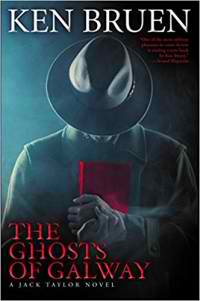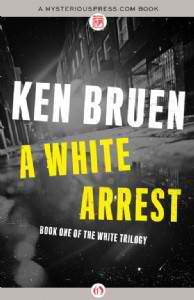The Ghosts of Galway by Ken Bruen
 Monday, October 23, 2017 at 10:00AM
Monday, October 23, 2017 at 10:00AM 
Published by Mysterious Press on November 14, 2017
The Ghosts of Galway has several meanings in Ken Bruen’s novel of the same name, including Jack Taylor’s many departed friends, the Galwegians whose death he has caused or for which he blames himself, and a social protest movement that identifies itself by that name. The story’s local color includes the hated water tax and some dead swans, but Jack’s running commentary touches upon American politics, as well. He’s more interested, however, in American television, although politics is just another form of televised entertainment.
Jack is more concerned about his old demons than any new ghosts, but life never lets him take the back seat he so fervently hopes to occupy. Worried about his mortality after receiving an ambiguous diagnosis, Jack would like to patch up some friendships, but his old friends are having none of it. That leaves him with Emily, who in recent novels has been a dangerous friend. She’s even more dangerous in this one.
Jack is recruited to obtain The Red Book, purportedly written as a counterargument to The Book of Kells in about 800 A.D., if it exists at all. Jack loves to read but he doesn’t want his life to be the plot of a Dan Brown novel, so he decides to pass on the job until the paycheck convinces him otherwise.
The job should be easy since the book is for sale in Galway, having been pilfered from the Vatican library by a rogue priest. Of course, nothing is easy for Jack. Nor for his friends (although he has few), who have a tendency to die. Even former friends suffer death by association. In fact, everyone and everything Jack cares about dies. That tendency plagues Jack again in this novel. Each new death adds another layer of grief and guilt to his life, sending him deeper into the bottle, even as he tries to cope by pursuing his own form of makeshift justice. I don’t know if there’s another protagonist in crime fiction who has such a good heart and such an awful life as Jack Taylor.
Jack is in love not just with books but with language, and is fond of mocking young people who have (in his view) corrupted it with words like “basically,” an all-purpose single-word answer to any question. Bruen uses Taylor to spew forth a running commentary on popular culture, including writers and films and television shows he admires and those he could do without. My favorite moment in this book comes when Jack tries to pick up a woman in a bar by discussing the merits of an Irish writer and, when the woman says “I don’t read,” responds “What the f--- is wrong with you?” Of course, the woman walks away. Story of Jack’s life.
The Ghosts of Galway might best be viewed as an interlude. Bruen cleans up some plotlines that have dangled in the last two or three novels, presumably paving the way for something new. I’m glad Bruen did that, but as a cleanup novel, The Ghosts of Galway is less satisfying than some of his other work. Which isn’t to say that the novel can't be enjoyed for the reasons that every Bruen novel is enjoyable: the pop culture references, the dry wit, the laconic writing style. Bruen’s novels are known for their brutal endings, and this one has two. Jack is not the victim of the first, but then another, less obvious brutal moment arrives, another downer to plague Jack’s life, and all is right with the world.
I wouldn’t recommend The Ghosts of Galway to anyone who hasn’t read other Jack Taylor novels, because it probably won’t seem to go anywhere. To the extent that the plot deals with The Red Book, it kind of fizzles out. I would, however, recommend reading the series in order from the beginning, because the full arc of Jack’s life is what the series is ultimately about. I don’t know where the next novel will go, since Jack has almost no friends (or even enemies) left in his life, but as always, I look forward to reading it.
RECOMMENDED



